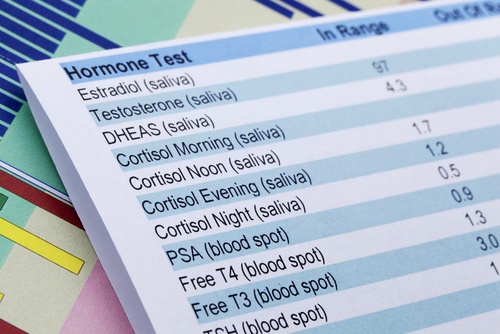By Magali Wolff
Diagnostic testing has a long, bloody (i.e., blood-based) history, and when a physician orders a test, the usual response is to strap on a tourniquet, pull out a syringe, and extract a venous blood sample. For some tests, though, and, especially to measure levels of steroid hormones such as estrogen, testosterone, or cortisol, a blood sample might not be the best choice.

Bottom line: saliva is the clear choice versus blood for hormone testing.
Consider putting away the syringe, relieving the patient of the fear and discomfort of a needle stick, and collecting saliva samples instead. Not only are today's saliva tests highly sensitive and accurate, but saliva diagnostics also offer the most reliable method for measuring levels of free, bioavailable hormones.
Saliva testing has come a long way since it first made its appearance in the 1980s. Advances in sample collection methods and increasingly sensitive and robust assays, have led to substantial growth in the saliva diagnostics market. With more laboratories offering saliva-based testing for an expanding range of applications, the unique advantages of saliva diagnostics have gained widespread recognition.
A better choice for clinicians and patients
Unlike blood-based tests, saliva diagnostics can measure the amount of free, unbound hormone that is available to act on a target tissue. About 95-99% of steroid hormones circulating in the bloodstream are bound to carrier proteins. Saliva contains unbound, bioavailable hormones. Therefore, salivary concentrations better represent circulating levels of free hormones, 1 which are likely to affect the body and be responsible for symptoms related to excessive or deficient hormone levels.
Among the advantages of saliva tests versus blood tests are the non-invasive and stress-free nature of saliva sampling. Hormone testing may often require baseline measurements as well as periodic tests to monitor a particular condition or adjust therapeutic dosing. Saliva sampling must be done correctly, but today's collection devices make it easy, and patients can collect their own samples during the day or night as needed, to measure fluctuations in hormones such as cortisol or melatonin, for example. Saliva testing also provides an easy and convenient way to acquire the periodic measurements of various sex hormones in women of reproductive age for the treatment of fertility problems, or in peri- or post-menopausal women to adjust and personalize dosing in hormone replacement therapy.
Research on salivary Cortisol is steadily ongoing in the field of biopsychology. More information is available from the International Society of Psychoneuroendocrinology (ISPNE) at www.ispne.net.
You've come a long way: saliva hormone testing
Accurate salivary hormone measurements depend on several factors, including proper saliva collection, as well extremely sensitive assays. Improper sampling and the use of less than robust assays and testing techniques will lead to poor results. These types of issues plagued saliva diagnostics in its early years and led to a great deal of skepticism regarding its scientific validity. However, doubts regarding the accuracy and diagnostic utility of saliva testing performed using current collection devices and assay methods are no longer relevant.
Consider a recent study that compared salivary and blood levels of the steroid hormone cortisol in healthy young women and evaluated the use of cortisol concentrations as a biomarker of metabolic status. Researchers examined the link between cortisol levels and metabolic factors such as blood lipid and glycosylated hemoglobin (HbA1c) levels. The results showed a significant association between salivary -- but not blood -- cortisol concentration and increased HbA1c. Salivary cortisol secretion was also linked to triglyceride and high density lipoprotein (HDL) cholesterol levels, whereas blood cortisol concentrations were not.2
The choice is yours
Luminescence immunoassays and ELISA assays with a built-in enzymatic signal amplification system provide exquisite sensitivity and can enable the use of saliva diagnostics to measure very low concentrations of hormones that play a role in a range of disorders. The high sensitivity and reliability of these tests combined with the ease, convenience, and needle-free benefits of saliva sampling, and the availability of automated systems such as the Freedom EVO® to ensure fast and accurate test results are driving substantial growth in the saliva diagnostics market.
Visit our website on saliva diagnostics to learn more about saliva based hormone testing.
FURTHER READING
- Lewis JG. Steroid analysis in saliva: An overview. Clin Biochem Rev. 2006;27(3):139-146.
- Konishi S, O'Connor K. Salivary but not blood cortisol excretion is associated with metabolic biomarkers in healthy young women. Am J Hum Biol 2016; 28(4):539-544.
About the author

Magali Wolff
Magali Wolff is the Head of Global Reagent Marketing and Support at Tecan. She has been with the company since 2001. Magali and her team of product managers are dedicated to providing Tecan’s customers with the best service and quality products for their daily workflows.











